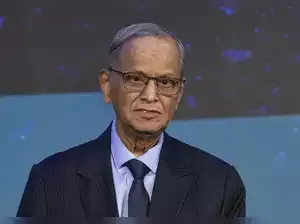Narayana Murthy, co-founder of Infosys, on Monday shared his insights on 'Compassionate Capitalism' at the Kalichand Memorial Lecture in Mumbai. During his speech, the 78-year-old said, the question of stark poverty and inequity in India has been troubling him right from that day when he spent lonely, hungry, cold, angry, and introspective 21 hours in the goods compartment on a freight train from Nis in now Serbia to Istanbul, way back in 1974 on his hitchhiking trip, returning back to India after his job in Paris.
"I have had some success in demonstrating the power of entrepreneurship in solving the problem of poverty through my experiment of creating Infosys. When I look at the big canvas of India, there is not a single day when I do not feel confused, helpless, agitated and motivated that our leaders will find a solution to this problem," said Murthy.
Recently, Murthy's controversial comments about India's work productivity made headlines. He had suggested that to improve productivity and compete globally, India’s youth should commit to working extra hours, as seen in countries like Japan and Germany after World War II. His suggestion to return to a 6-day workweek and extend work hours sparked nationwide discussions.
"We must remember that with a per-capita (income) of $2,300, India is a poor country," he told ET last year. "For us to become a middle-income country (with a per-capita of $8,000-10,000) it will take about 16 to 18 years even with an annual growth rate of 8%."
"My parents told me that the only way I can escape from the orbit of poverty was by good values - honesty, hard work, discipline, and good work ethic," he said. "Putting the interest of the community ahead of one's personal interest in the short and medium term will lead to personal betterment. I know every nation that became prosperous did so through hard work."
Born on August 20, 1946, in Sidlaghatta, Karnataka, Murthy graduated in Electrical Engineering from the National Institute of Engineering in 1967 and later earned a Master’s degree from IIT Kanpur in 1969. Rather than pursuing a high-paying job, Murthy chose to take on the challenging role of Chief Systems Programmer at IIM-A, where he worked under Professor J. Krishnayya on India’s first time-sharing computing system. This role marked the beginning of a career that would eventually lead to the founding of Infosys in 1981, a company that has played a significant role in India's tech-driven growth.
Budget with ET
India looks to bring more women into workforce
A game changing budget to revive India’s backbone - agriculture
How would you plan India's Budget? Give it a try
Recently, Murthy's controversial comments about India's work productivity made headlines. He had suggested that to improve productivity and compete globally, India’s youth should commit to working extra hours, as seen in countries like Japan and Germany after World War II. His suggestion to return to a 6-day workweek and extend work hours sparked nationwide discussions.
"We must remember that with a per-capita (income) of $2,300, India is a poor country," he told ET last year. "For us to become a middle-income country (with a per-capita of $8,000-10,000) it will take about 16 to 18 years even with an annual growth rate of 8%."
"My parents told me that the only way I can escape from the orbit of poverty was by good values - honesty, hard work, discipline, and good work ethic," he said. "Putting the interest of the community ahead of one's personal interest in the short and medium term will lead to personal betterment. I know every nation that became prosperous did so through hard work."
Born on August 20, 1946, in Sidlaghatta, Karnataka, Murthy graduated in Electrical Engineering from the National Institute of Engineering in 1967 and later earned a Master’s degree from IIT Kanpur in 1969. Rather than pursuing a high-paying job, Murthy chose to take on the challenging role of Chief Systems Programmer at IIM-A, where he worked under Professor J. Krishnayya on India’s first time-sharing computing system. This role marked the beginning of a career that would eventually lead to the founding of Infosys in 1981, a company that has played a significant role in India's tech-driven growth.








